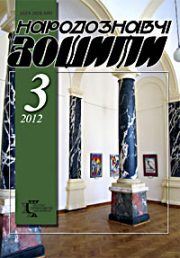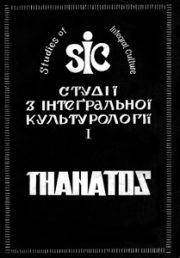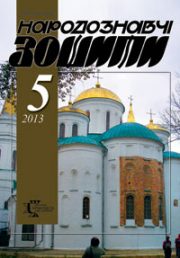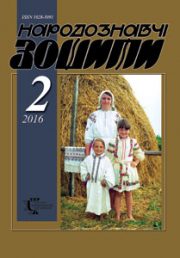The Ethnology Notebooks. 2018, 6 (144), 1347–1365
UDK 316.75(=161.2):321:351.746.1](477)»20»
DOI https://doi.org/10.15407/nz2018.06.1347
Received 21.11.2018
A VISION OF THE IDEOLOGY OF BUILDING A NATIONAL STATE — AN EXCLUSIVE UKRAINIAN NATION
ORCID ID: https://orcid.org/0000-0002-4183-7857
Vovkanych Stepan Yosypovych, doctor of economics, professor,
economist, sociologist, politilogist,
Honored figure of science and technology of Ukraine,
leading researcher
in M. I. Dolishnii Institute of Regional Studies
of National Academy of Sciences of Ukraine,
4 Kozelnytska Str., 79026, Lviv, Ukraine.
Contacts: Tel. (097)074-6071; e-mail: lsvovkanych@gmail.com
Abstract. The article focuses on the concept of the modern Ukrainian National Idea (UNI), the components of which are considered as stratagemes (plans of action) of state-building in Ukraine in terms of the hybrid war imposed by Russia. Particular emphasis is placed on the importance of the socio-humanistic approach to spiritual and intellectual principles of ideological support of state-building processes in Ukraine as a qualitatively strategic imperative of strengthening the system of national security of Ukraine, including ideological-information, cybernetic security, etc. At the same time, a separate stress is set on an extreme solution of the need for creation of sustainable systems of international security and world order, the impudent and cynical neglect of which enabled annexation of Crimea by Russia and escalation of the criminal hybrid war in Donbass. It is highlighted that the socio-humanistic emphasis on binary protection of both a man and nation in terms of Russia’s globalization of the hybrid war and Russian mass media disinformation of the world regarding, on the one hand, the true national liberation senses of UNI; on the other hand, concealing imperial chauvinistic and aggressive interests of Russia, — has put forward not only the cognitive-informational, spiritual and intellectual aspects of their complex, qualitatively new solution at the national level. It also has stressed that effective binary protection is possible in conjunction with a simultaneous strengthening of the international security systems of the Euro-Atlantic military alliance, the UN structures along with consideration of exclusively natural, linguistic, cultural, religious and historical right of indigenous peoples to build their own national states, thus enriching world diversity. The semantics of the article is addressed to those Ukrainians (and not only Ukrainians), who, according to the third President of Ukraine V. Yushchenko, can say that they are experiencing a great moment of self-assertion and ideological-value reorientation. Many pages of our self-identification have been opened. Millions have plucked up their courage, we felt ourselves Ukrainians more deeply. However, if we lose the national revival, if we do not pay attention to the problem of national consciousness, to the strategic idea of the country’s development, to information security of the national space, we will lose as a nation. The benefits and strength of the community as a nation begin with this. Just with this the French, Germans, Lithuanians and Poles have begun. If you have addressed the national issue, you have addressed everything; if not — you are uninteresting and primitive. The article might be of interest to those who strengthen the subjectivity of Ukraine and does not allow it to be pushed to the margins of the world civilized development.
Keywords: socio-humanistic principles of state-building, Ukrainian national idea, stratagems of a country’s development, spiritual and informational mobility of a man (nation), spiritual and intellectual elite, national state.
REFERENCES
Adzhemohlu, D., Robinson, D. (2016). Chomu natsiyi zanepadayut’. Kyiv: Nash Format [in Ukrainian].
Belebekha, I. (2014). Natsiya i natsionalizm Vid natsionalizmu do natsional’noyi ideyi.
Kharkiv [in Ukrainian].
Belebekha, I.O., & Vovkanych, S.Y. (2010). Yednist’ i rozmayittya stratehichnykh priorytetiv natsional’noyi ideyi (ukrayins’ki derzhavotvorchi dialohy). Seriya: Ideolohichni problemy Ukrayiny XXI storichchya. L’viv ; Kharkiv [in Ukrainian].
Vovkanych, S.Y. (2015). Aksiolohiya derzhavotvorchykh protsesiv za umov sotsial’no-ekonomichnykh zmin: novykh vyklykiv i zahroz natsional’niy bezpetsi. Stratehichna panorama, 1, 76—83 [in Ukrainian].
Vovkanych, S.Y. (2018). Sotsiohumanistychnyi imperatyvy transformatsiyi humanitarnoyi polityky v umovakh hibrydnoyi viyny i zahroz buttyu ukrayins’kosti. Prep. nauk. dop. L’viv: Instytut rehional’nykh doslidzhen’ im. M.I. Dolishn’oho NAN Ukrayiny [in Ukrainian].
Vovkanych, S.Y. (2003). «Dim» natsiyi i hlobalizatsiyni tendentsiyi. Sotsiohumanistychni komponenty stratehiyi rozvytku Ukrayiny. Visnyk NAN Ukrayiny, 4, 48—58 [in Ukrainian].
Vovkanych, S. (1999). Ukrayintsi prykordonnya: problemy rehionalistyky chy hlobalistyky? In Informatsiya. Intelekt. Natsiya. L’viv: Yevrosvit [in Ukrainian].
V.P., Horbulina, O.S., Vlasyuka, E.M., Libanovoyi, & O.M., Leshchenko (Ed.). (2015). Donbas i Krym: tsina povernennya. Kyiv: NISD [in Ukrainian].
Kruhlyy stil «Demokratiya i suspil’na transformatsiya v konteksti viyny na Donbasi». (2017). Sotsiolohiya: teoriya, metody, marketynh, 2, 3—35 [in Ukrainian].
Natsional’na elita ta intelektual’nyy potentsial Ukrayiny. (1996). In S.Y. Vovkanych (Ed.). Materialy mizhnarodnoyi nauk. konf. «Natsional’na elita ta intelektual’nyy potentsial Ukrayiny». L’viv: IRD NAN Ukrayiny; Mizhnarodnyy tsentr osvity, nauky i kul’tury [in Ukrainian].
Ukrayins’kyy dilovyy tyzhnevyk «Kontrakty». (2008, 15 hrudnya). Pres-konferentsiya «Proekt «Ukrayina». Formuvannya efektyvnoyi natsional’noyi ideyi». Kyiv: Halyts’ki kontrakty [in Ukrainian].







